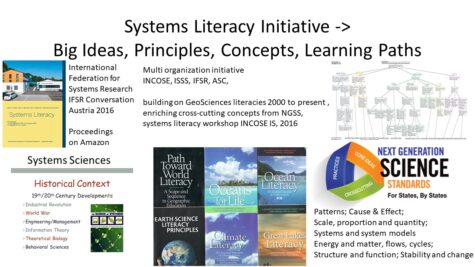For the January 2024 Systems Thinking Ontario session, educational game designer Scott DeJong and innovation designer Geoff Evamy Hill joined a conversation moderated by Zaid Khan. Mutual interests in the new field of educational design and games were at the core of the discussion. This was an opportunity for systems thinkers to expand their knowledge on developments that were not in present in the 20th century.
After the usual round of self-introduction by web conference participants, Scott and Geoff described their experiences in the field, and ongoing research questions. The conversation was segmented into three parts, so that participants had the opportunity to inject questions and comments.
This recording of the session is available on Youtube, as well as on the Internet Archive .
| Video | H.264 MP4 |
| January 15 (1h48m) |
[20240115_ST-ON_EducationalGameStudies ScottDeJong_GeoffEvamyHill.m4v (1920×1080 921kbps 814MB) [on the Internet Archive] |
A standalone audio was also created during the meeting.
| Audio | |
| January 14 (1h48m) |
[20240115_ST-ON_EducationalGameStudies ScottDeJong_GeoffEvamyHill.m4a] (126kbps, 99 MB) [on the Internet Archive] |
Here is the core of original abstract sent in advance.
— begin excerpt —
‘Learning’ is a central focus for systems thinkers. Whether it’s an attitude, a feature of a system, or an outcome. ‘Learning’ runs through systems thinking. So what might systems thinkers learn from games that are designed for, well, learning?
Enter “Educational Game Studies”, an emerging field that focuses on how games and their systems can inform the public about various issues.… Read more (in a new tab)
For the January 2024 Systems Thinking Ontario session, educational game designer Scott DeJong and innovation designer Geoff Evamy Hill joined a conversation moderated by Zaid Khan. Mutual interests in the new field of educational design and games were at the core of the discussion. This was an opportunity for systems thinkers to expand their knowledge on developments that were not in present in the 20th century.
After the usual round of self-introduction by web conference participants, Scott and Geoff described their experiences in the field, and ongoing research questions. The conversation was segmented into three parts, so that participants had the opportunity to inject questions and comments.
This recording of the session is available on Youtube, as well as on the Internet Archive .
| Video | H.264 MP4 |
| January 15 (1h48m) |
[20240115_ST-ON_EducationalGameStudies ScottDeJong_GeoffEvamyHill.m4v (1920×1080 921kbps 814MB) [on the Internet Archive] |
A standalone audio was also created during the meeting.
| Audio | |
| January 14 (1h48m) |
[20240115_ST-ON_EducationalGameStudies ScottDeJong_GeoffEvamyHill.m4a] (126kbps, 99 MB) [on the Internet Archive] |
Here is the core of original abstract sent in advance.
— begin excerpt —
‘Learning’ is a central focus for systems thinkers. Whether it’s an attitude, a feature of a system, or an outcome. ‘Learning’ runs through systems thinking. So what might systems thinkers learn from games that are designed for, well, learning?
Enter “Educational Game Studies”, an emerging field that focuses on how games and their systems can inform the public about various issues.… Read more (in a new tab)



